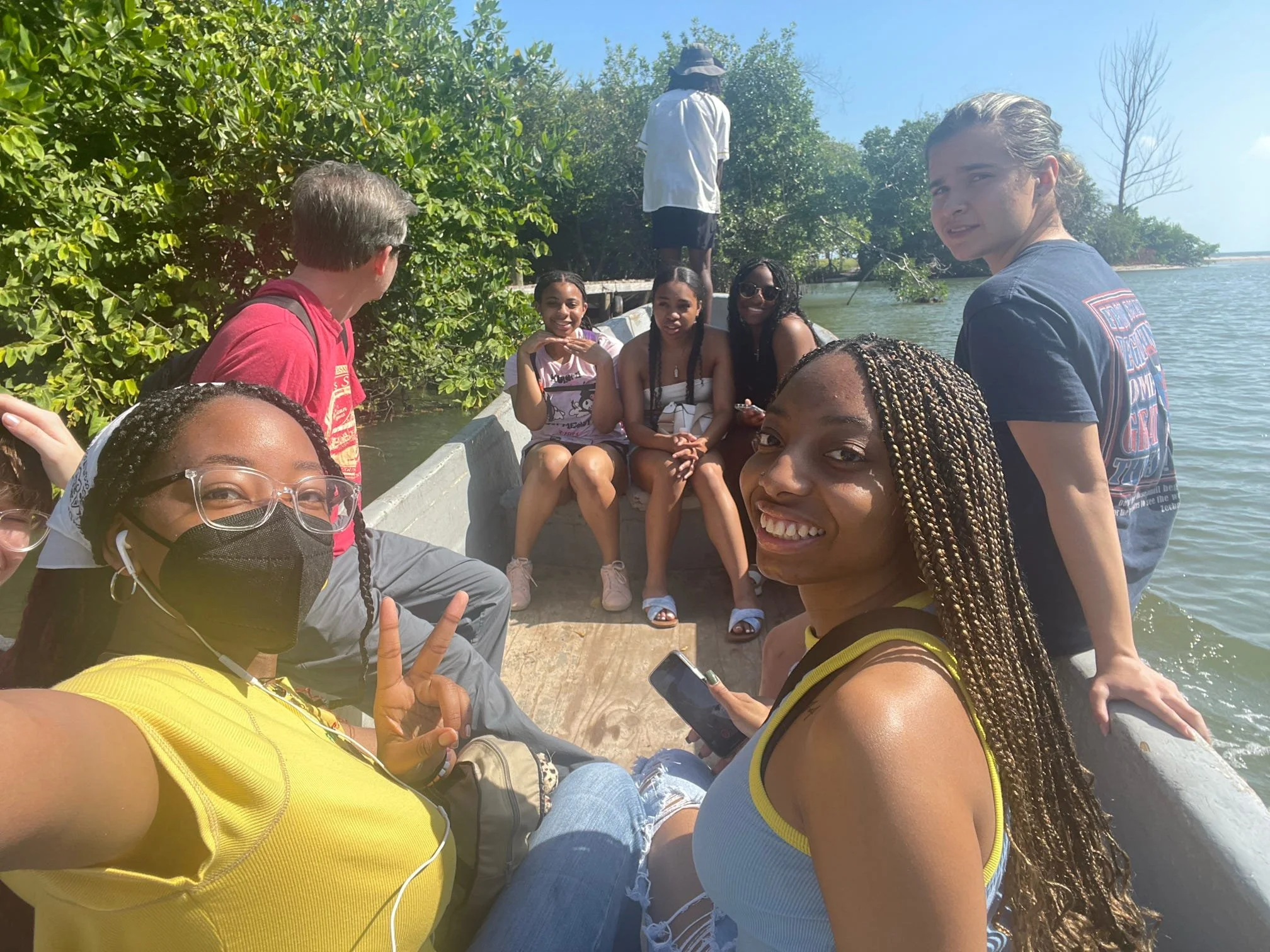The Ultimate Travel Abroad Packing List for Students
/The Ultimate Travel Abroad Packing List for Students
Meta Title: 14 Things to Include in Your Packing List When Traveling Abroad
Meta Description: Traveling internationally can be worrying if you don't know what to pack. Take the stress out of it with this comprehensive packing list for study abroad.
Packing for a study abroad trip can be worrisome, especially if it's something you have never done before. You must consider everything from the right bag to the contents within it, ensuring you don't miss anything important from your study abroad packing list.
Let us take some of the stress out of it with this international travel checklist, including everything you need for a smooth study abroad journey.
How to Pack Your Bag for International Travel
Effective packing is more than just cramming everything into your bag.
When studying abroad, you must pack efficiently to ensure your journey goes smoothly and your semester abroad runs perfectly. Firstly, consider the length of your stay and what you will do there.
Many digital nomads nowadays insist on taking only a carry-on bag, but some traveling students prefer to take a large backpack alongside their carry-on. This can also depend on the climate of your host country and the type of clothing you need.
Another top tip is to get packing cubes. They can help you organize your travel bag into categories so that it's easy to save space and find what you need. You can also use them to separate dirty and clean laundry while on the go.
It's also a good idea to start packing early so that you can make sure you have everything you need.
Without further ado, here's the ultimate packing list to help you plan your study abroad trip.
1. Choose the Right Bag for the Trip
Before you even start packing, you need to choose the right travel bag. Depending on where you are going, you may need a different style of bag.
Most commonly, students on a semester abroad opt for backpacking backpacks so that it's easy to move around and uneven pavements don't become an issue. While suitcases can feel more organized, pulling them around on wheels can become tiresome.
On shorter faculty-led study abroad programs, a suitcase might work fine, but you should be able to carry it up several flights of stairs as elevators might not be common in your destination. If you can’t carry it up the stairs, you are likely overpacking.
Make sure your bag of choice is sturdy and large enough to fit all your belongings but not so big that you can’t manage it. Here are some options from Wirecutter.
You should also consider a smaller day bag for flights and day trips. Having lots of pockets, straps, and a place for a water bottle is always a good idea. Some day bags come with anti-theft devices, which could be good if you’re bringing a laptop. More from Wirecutter in this category.
2. Important Documents to Bring Abroad
At the top of your packing list should be all your travel documents. This includes:
Passport
Driver's license and/or another secondary form of ID
Boarding pass
Travel insurance policy
Visa (if required)
Vaccination booklet (if required)
Paper with emergency contacts
Paper with credit card numbers
Paper copies of all important documents
Notably, you should pack these documents in your carry-on so that they remain close to you. Plus, you will need your passport and boarding pass on the plane, so they're no use to you in your luggage.
We also recommend bringing a money belt or money pouch where you can store your credit cards, cash, and other valuables. These pouches are hidden under your clothes and are hard to steal, which is really important in some parts of the world where pickpocketing is common.
Make a copy of your passport and upload it to the internet for access in an emergency. When going out, bring your copy and leave the actual passport in your hotel to reduce the risk of losing it.
We also recommend packing a list of emergency contacts in paper form, which will be useful if you lose your phone, as well as a written list of phone numbers for each credit card you carry, in case you need to cancel them due to theft or loss.
Copies of all of these items should be stored online.
3. Laptops and Other Electronics for Travel
Smartphones are essential for modern travel. They are useful for storing boarding passes, banking information, and other tickets. Plus, they let you keep in contact with your friends and family back home and other travelers you meet along the way.
Many students also take their laptops on study-abroad trips. You can use it to study, update your CV, and unwind with Netflix shows after a long day at work, not to mention Zoom calls. Remember that you will be living abroad, so you must consider what to do in your free time. We recommend spending as little time as possible on your computer, but there might still be times when it’s necessary.
It can also be a good idea to take an e-reader. They can save space compared to taking a pile of heavy books. If you take a laptop or an e-reader, ensure you have protective cases and the relevant travel insurance to protect your items.
Finally, you should bring a headlamp if traveling to rural areas especially around the equator, where it gets dark at 6pm every day and there might not be a lot of street lighting. In some places electricity might go out unexpectedly, and you don’t want to rely on your phone for light.
4. Power Adapters and Convertors in Other Countries
Speaking of electronics, make sure you have all the relevant chargers, adapters, and converters. Different countries use different electrical outlets and different voltages. Double-check that you have the right adapter, or you will be left unable to charge your cell phone.
You can pick up an adapter at almost any airport or online.
5. Comfortable Walking Shoes for Travel
When traveling for study or work, you will mostly be busy doing activities that require you to be on your feet. For example, our faculty-led programs include activities like visiting flower farms in Colombia or participating in construction projects in Panama. These activities require comfortable footwear.
Even for study abroad adventures like exploring your new city, you don't want to be stuck with uncomfortable shoes. If you are near the beach, you can also consider flip-flops, which still allow you to pack light while adding an alternative to sneakers or walking boots.
Be prepared to walk long distances in your shoes, so make sure you break them in before packing them.
Shoes are the bulkiest item, so take some multi-purpose options rather than packing all the shoes you own. A good option for warm climate destinations are comfortable running shoes with a mesh top and good tread. Your feet will stay cool in these even when the weather gets hot.
For colder climates, especially if going to urban areas, a nice pair of boots is best. They should be professional enough to go to class or a meeting, and rugged enough to withstand submersion in an icy puddle.
6. Travel Sized Toiletries
Travel-sized toiletries are an essential item in any bag. You don't need to go overboard and bring your whole makeup bag, but make sure you have all your essential toiletries.
Bring:
Shampoo and conditioner
Toothbrush and toothpaste
Body lotion
Shower gel or soap
Deodorant
Hand sanitizer
Small sunscreen
Razor and small shaving cream
Any everyday toiletries you use
Buying the useful items at home can help you save money since these essentials can cost more elsewhere. You might also not be able to find your preferred brands in other countries.
These items are heavy compared to your other packing needs, so don’t go overboard and only bring the toiletries you will actually use.
7. Climate-Friendly Clothing to Pack
When packing your clothes, make sure you carefully consider the climate of your study-abroad location. For hot weather, pack light fabric clothing, and summer clothes like shorts and t-shirts, ideally 100% cotton. Polyester doesn’t do well in humid conditions.
Take a look at the weather, too, because a light rain jacket rarely goes amiss, unless you are going to the tropics where it might be too hot to wear a rain jacket. A small umbrella might do the trick there. Take a few lighter options and a few things you can use to layer up to places that are hot in the day and cool at night.
For cold weather, make sure you have thermals ready and lots of layers. Three light layers (t-shirt, sweatshirt, and light jacket) will keep you warmer and be more versatile than one thick layer (one large jacket).
You should also ensure that you are comfortable working and moving around in the clothes you bring. Consider what local people wear. In European cities you will want to dress up. In much of Latin America you’ll wear pants and not shorts in the cities, regardless of your gender.
Furthermore, make sure you pack clothes to last the entire trip. If you are staying longer than a couple of weeks, check out the laundry arrangements in the place you are staying so that you can plan for your time abroad. Generally bring more socks and underwear than you think you will need and fewer shirts and pants than you think you will bring. You can wear shirts and pants twice, or even three times, before washing…but not your underwear.
Remember to take casual wear for relaxing and lounging, as well as working and studying. For example, if you have a free afternoon at the beach, you'll need your swimwear. Make sure you don't bring any culturally inappropriate clothing, either.
And don't forget your pajamas!
8. Credit Cards Abroad and Foreign Currency
It's a good idea to take out some currency before you set off on your trip. It's a good idea to research the host country's payment method to see what will work best for you.
Geneally, it is best to use an ATM card to withdraw money once you arrive to your destination. This way you get the best exchange rate possible. Just be sure to use your debit card and not your credit card for this. Taking money out with a credit card can be extremely expensive.
When checking your credit card off your packing list, ensure it's a card with no foreign transaction fees. Otherwise, you could rack up a hefty bill during your international trip. There are plenty of banks that offer such cards, like Capital One.
Don’t bring traveler’s checks. Tell your parents, who might have suggested the idea, that they are no longer used.
9. Reusable Water Bottle
It's a good idea to take a reusable water bottle so that you don't need to keep buying water. In many countries, however, it's unsafe to drink water from the tap, so do some research on your destination before you leave. Usually, your hotel or other places will have water dispensers from which you can fill up.
10. Quick-Dry Travel Towel
Depending on where you stay, there may not be towels available. Having your own towel on hand is convenient, and a quick-dry towel is better if you plan on moving around a lot. Consider a towel one of your travel essentials.
11. Medicine or First Aid Kit
Don't forget to pack a basic first aid kit. It doesn't have to be bulky and take up too much space, but you should pack a couple of medications, including:
Band-aids
Oral rehydration salts
Allergy medicines
Sunscreen
Pain killers
Thermometer
Cold and flu medication
Insect repellent/sting reliever
Make sure you do your research in advance to find out if any prescriptions you have are available in your host country. If not, pack enough supplies to take from your home country, and make sure you have copies of your prescriptions.
12. Basic School Supplies
When you travel to study abroad, it's easy to forget the essential items you need for studying. Typically, you won't need a lot. A small pencil case and a notepad should do, especially if you plan on taking a laptop with you.
13. Host Family Gift
If you stay with a family when you study abroad, don't forget to pack them a small gift. Studying abroad is a cultural exchange, after all, and they will usually appreciate a little something from your home country to say thanks. The best gifts are ones that are unique to where you are from and share a bit of your own culture. The gift should not be expensive, which might make it awkward.
14. Familiar Extras
If you have space in your luggage, make sure you take other things to keep you comfortable during your year abroad. It can be a good idea to take a journal to document what happens during studying abroad to look back on in years to come.
You can also consider taking things like travel games, books to read on long bus rides, and any other personal item you want to keep close by.
That said, don't overfill your bag - leave some space to bring back a few souvenirs!
Ready to Travel Abroad?
With this ultimate packing checklist, you can pack for study abroad with ease. Now, it's time to get excited about your upcoming adventures and the new friends you will meet along the way.
Are you interested in culturally immersive travel but don't know where to start? Contact us to find out more about our short-term study programs.



























